Conference DEFCON 25. Garry Kasparov. "The Last Battle of the Brain." Part 1
It is a great honor for me to be here, but please don't hack me. Computers hate me already, so I need to make friends with as many people as possible in this room. I want to bring one small trifle from my biography, interesting for the American audience. I was born and raised in the very south of the country, right next to Georgia. This is actually true. Wait a second, I told you that computers hate me!
One slide was lost, but it is really the very south of the USSR, where I was born in the republic, which was located right next to the Republic of Georgia (note of the translator: the name of the state of Georgia and the Republic of Georgia in English sounds the same).

')
Speaking of my homeland, the funny thing is that my last book, Deep Thinking, was written about artificial intelligence, about my own experience of computer battles, and a book written two years before that was called Winter Is Coming. It was not a synopsis of the “Game of Thrones”, it was about Vladimir Putin and the struggle for a free world, but when I conducted a tour of the presentation of this book, everyone wanted to ask me about chess and the IBM Deep Blue computer. Now, when I present the book "Deep Thinking", everyone wants to ask me about Putin. But I try to stick to the topic, and I am sure that after this presentation there will be several questions that I will be happy to answer. I am not a politician, so I don’t shy away from answering questions.
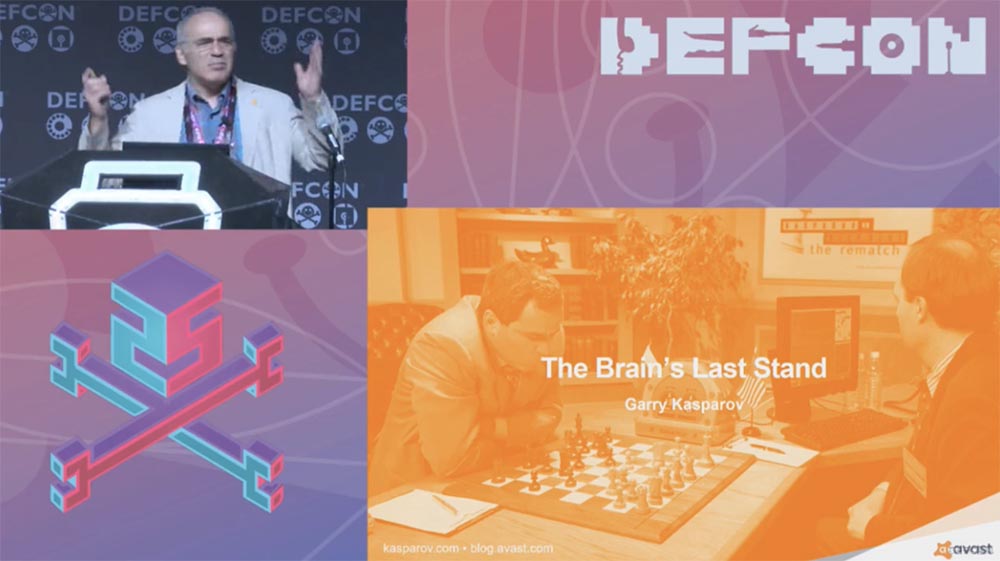
It may seem strange that the game of chess, which arose thousands of years ago, God knows when, is an ideal analogy of artificial intelligence, because when we talk about AI, we must remember that the letter I means "intelligence", and there is nothing that shows it's better than chess.
Many people believe that chess is nothing more than fun, which people indulge in cafes. If you look at the creations of Hollywood, then everyone plays chess - aliens, people X, Wizard, vampires. My favorite film “Casablanca” with Humphrey Bogart is also about chess, and when I watch this film, I always want to take a position to look inside the screen and see Bogart’s board. He plays the French defense, which was very popular in the early 40s. I think Bogart was a pretty decent chess player.
I want to mention that Alfred Binet, one of the co-authors of the IQ-test of the end of the 19th century, admired the mind of chess players and studied it for many years. Therefore, it is not surprising that the game of chess attracts those who want to create smart machines. However, it often happens that intelligent machines, such as the “Turk” von Kempelen, are simply a great deal of cheating. But at the end of the 18th century, this chess machine was a great miracle, he toured Europe and America and fought with strong and weak players, such as Franklin and Napoleon, but of course it was all a hoax. “The Turk” was not a real machine, it was the original mechanical system of sliding panels and mirrors, inside which a powerful player was hiding - a man.
It is interesting that after a hundred or two hundred years, during the last twenty years, the opposite situation is observed - we see in tournaments that human players try to hide computer devices in their pockets. So now we have to look for a computer hidden in a human body.
However, stories with mechanical devices are relatively little known. The first mechanical device for the game of chess appeared in 1912, it played with the help of one mechanical part, it could make a mat a rook, but it could not be called a prototype of the first computer.
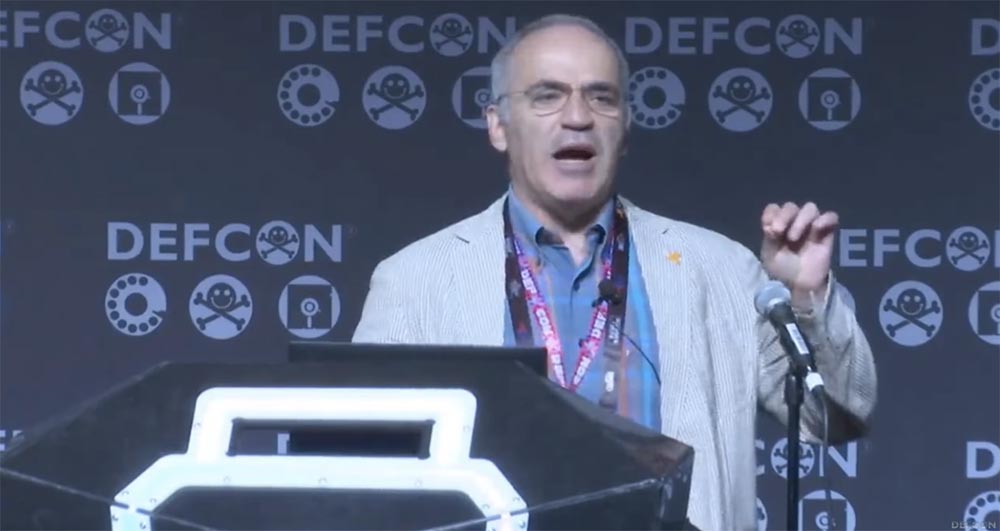
Interestingly, the basics of computer design, such as Alan Turing and Claude Shannon, have shown great interest in chess. They believed that the game of chess can reveal the secrets of artificial intelligence. And if one day the computer wins an ordinary chess player or world chess champion, this will be a manifestation of the evolution of AI.
If you remember, in 1952, Alan Turing created the first computer program for playing chess, and this was a great achievement, but even more significant was that at that time there were no computers yet. It was just an algorithm that he used to play chess, and he acted like a human computer processor. It is important to remember that the founding fathers of computers determined the way in which the AI was to follow, following the processes of human thinking. The opposite is what we call a brute-force attack, or a quick search through possible moves.
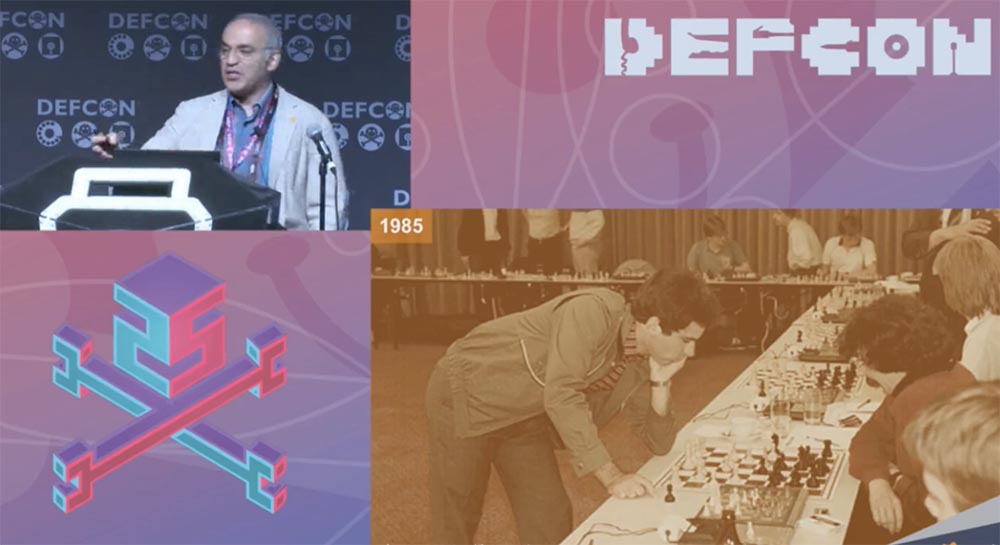
I did not hear anything about competition with computers in 1985, but in this photo you can see 32 boards, and although I played with people, but in reality it was a real game against computers. At that time there were 4 leading manufacturers of chess computers, which just introduced them to the world. Probably, some of you still have such computers, now they are real rarities. Each manufacturer had 8 computer modules, so really I played with 32 opponents and won all the games.
It is very important that this was not a surprise, but a natural result, and every time I look at this photo, where my victory is captured, I remember this time as the golden age of chess machines, when they were weak, and my hair - thick.
So, it was June 1985, and 12 years later I played against just one computer. In 1997, there was a rematch, because I won the first match that took place in 1996 in Philadelphia. I lost this rematch, but for the sake of fairness, a turning point in computer chess did not take place in 1997, but in 1996, when I won the match, but lost the first game. Then I won 3 games, and the score was 4: 2 in my favor.
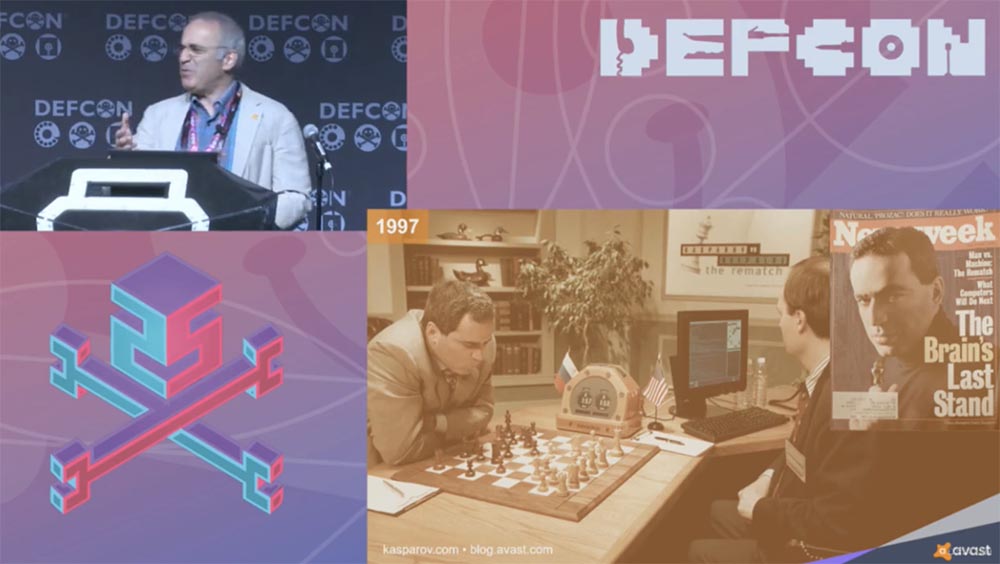
In fact, the fact that a computer at that time was able to become a world chess champion if it played in an ordinary chess tournament was important here. I didn’t expect from IBM that they could do such a serious technical work to strengthen their computer in a year. But my biggest mistake, with the exception of a sharp rise in IBM stock prices, which jumped from several points to a billion dollars 2 weeks after the match, was the inability to read the fine print. Because one of the problems of 1996, which I encountered while playing with the Deep Blue computer, was that for me it was a “black box”. I did not know anything about the opponent, about how he thinks, what tactics he uses. Usually, when you prepare for a game, you study your opponent, no matter whether it is a chess match or a football match, and, watching the style of the game, you learn its strategy. But there was no information about the “play style” of Deep Blue.
I tried to be smarter and said that for the next match I should have access to the games played by Deep Blue. They answered: “Of course!”, But at the same time they added in small print:
"... only during official competitions."
And this is despite the fact that Deep Blue has not played a single game outside the laboratory walls. So in 1997 I played against the “black box”, and everything turned out the opposite of the events of 1996 - I won the first game, but lost the match.
By the way, where were you, hackers, 20 years ago, when I needed them so? However, when I look at the ranks of those present, I understand that many of you, probably, were not born yet.
My biggest mistake was that I perceived the match with Deep Blue as a great scientific and social experiment. I thought it would be great, because it would really find an area where human intuition can be compared to the “brute force” of computer calculations. However, Deep Blue, with its phenomenal computing speed of about 2 million chess positions per second, which was quite good for 1997, was anything but artificial intelligence. His game did not contribute to the disclosure of the mystery of human intelligence.
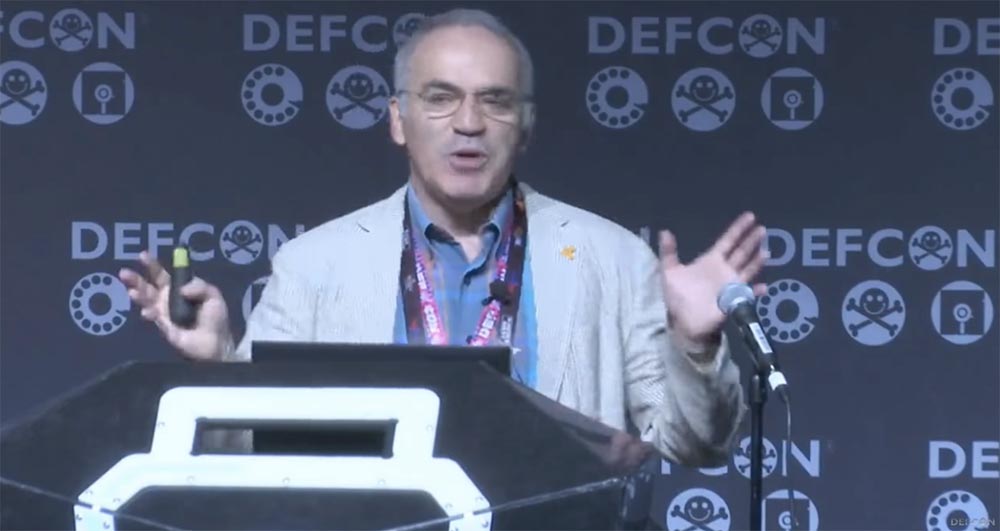
He was intelligent no more than an ordinary alarm clock, but it’s not easier for me that I lost an alarm clock worth $ 10 million.
I remember the press conference during the opening ceremony of the match, when the person in charge of the IBM project said that this would mark the end of scientific experiments and the victory of science. Since we had one victory and one loss, I wanted to play the third match in order to find out who is stronger, but they disassembled the computer, apparently, to remove the only impartial witness. I tried to find out what happened to Deep Blue, but I couldn't find out. Later, I learned that he had made a new career and now he is preparing sushi at one of the terminals at Kennedy Airport.
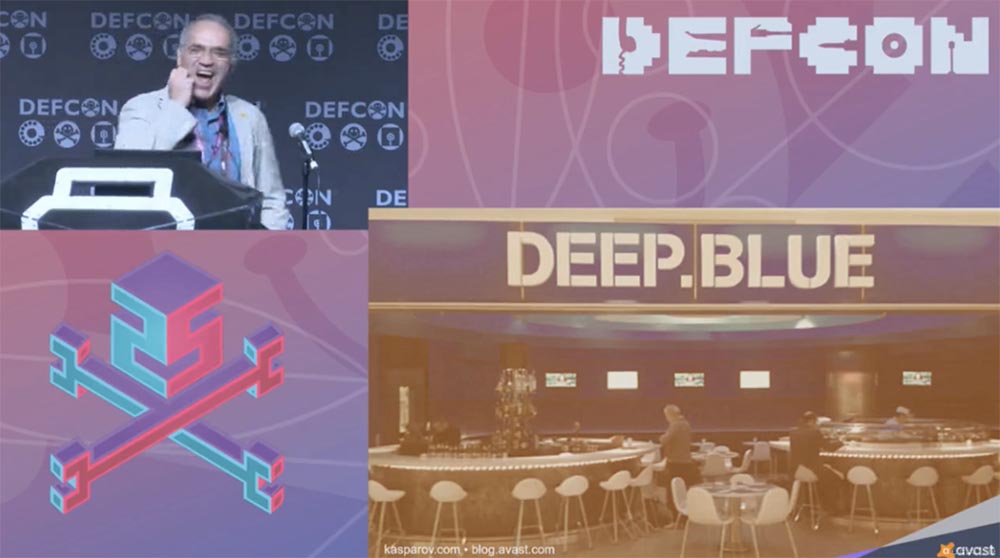
I love sushi, but I don’t need a computer there. So, on this my story with computer chess pretty quickly ended. But those of you who also play chess or other games know how vulnerable we are compared to computers, because we are not so stable, impartial and make mistakes. Even the highest level players make mistakes, for example, during a match for the title of champion, where 50 or 45 moves are made, at least one tiny mistake is inevitable. If real people play, it doesn’t matter much, but if you make a mistake when playing with a machine, then it’s possible that you won’t lose, but won’t win, because the machine will avoid defeat.
At some point, I realized that it was just a matter of time, because we cannot achieve the same level of vigilance and accuracy that is necessary to defeat a computer, because the machine is unusually stable in its actions. Years later, we witnessed the machines constantly winning matches. I repeat once again - this all concerns only the game of chess, which is very vulnerable to the brute-for-se game method, when a computer goes through a lot of options with great speed and chooses the most optimal one. This is not artificial intelligence, so people make a mistake when they say that a person - a chess player was defeated by artificial intelligence.
Later I played a few more matches against computers. Once I analyzed these games using modern chess engines, and it was a rather painful experience. It was a journey into the past, and I was forced to admit how poorly I played these matches, because I could only blame myself. However, at that time the computer “demon” was not so powerful, you may not believe it, but the free chess application on your mobile device is today stronger than it was Deep Blue. Of course, if you have a chess engine like asmFish or Comodo and the latest laptop, this system will be even more powerful.
When I played against Deep Blue, I think it was the 5th game, the computer in the endgame put the perpetual check, and everyone started saying that it was a great victory and that the computer showed the phenomenal quality of the game. But today, with a modern computer, it looks ridiculous. Our entire match can be played in 30 seconds, maximum a minute depending on the performance of your laptop. In the beginning I made a mistake, then I tried to save the game, Deep Blue made several retaliatory moves and won. These are the rules of the game, and there is nothing wrong with that.
In 2003, I played 2 more matches against the X3D Frintz computer, they both ended in a draw. The organizers made me wear 3-D glasses, because the computer had a 3-dimensional interface.
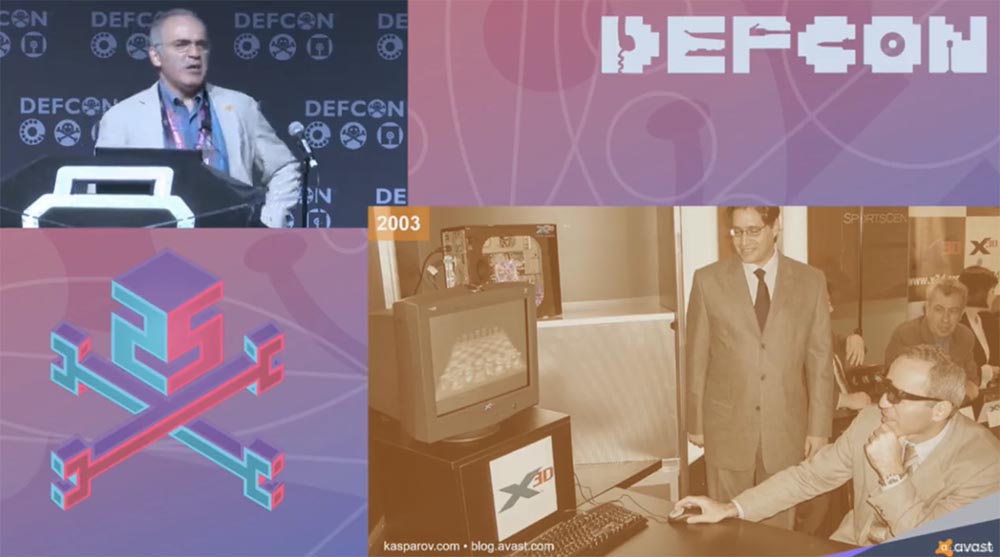
But in any case, the story was over and I was thinking about the future. Look at this photo that was taken at the beginning of this century.
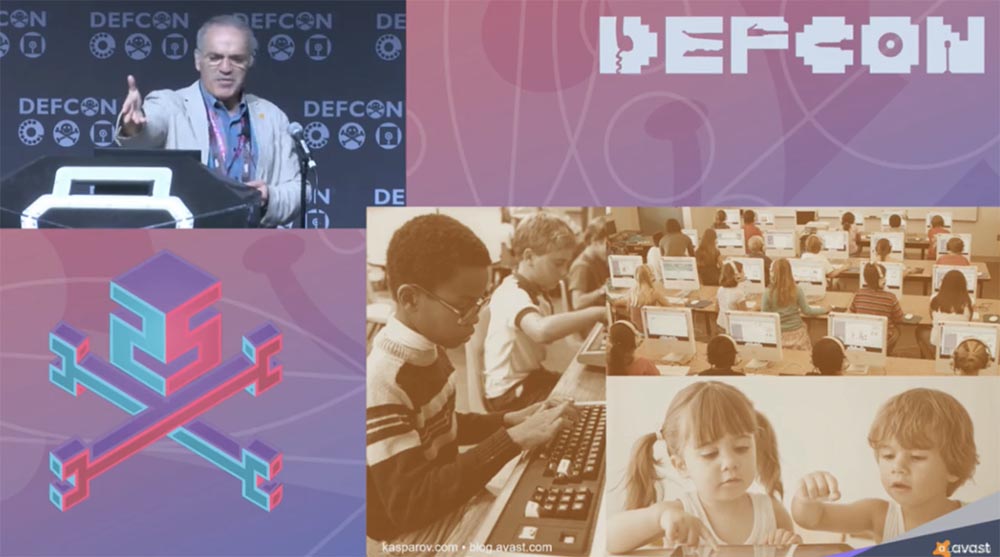
If you look at these children, it is clear that they play on rare computers. Today, my children will not even understand what it is. Some complex keyboards are depicted here, and now they are simply sliding their fingers along the touchscreen.
The important thing is that more intelligent machines make our tasks much easier. Probably, I say this in vain, because you know it better than anyone else. Thus, with the help of Peppa Pig and technical tasks, the path is cleared for genuine creativity.
I was thinking about how to connect the power of a computer and a person? You can take chess as an example, because there is a solution in chess. You know perfectly well in which areas the computer is strong, and in which it is inferior to man. And then a concept I called “advanced chess” came to my mind.
Following the Russian proverb: “if you cannot win, join us!” I called the game advanced chess when one person with a computer fights against another person with a computer.
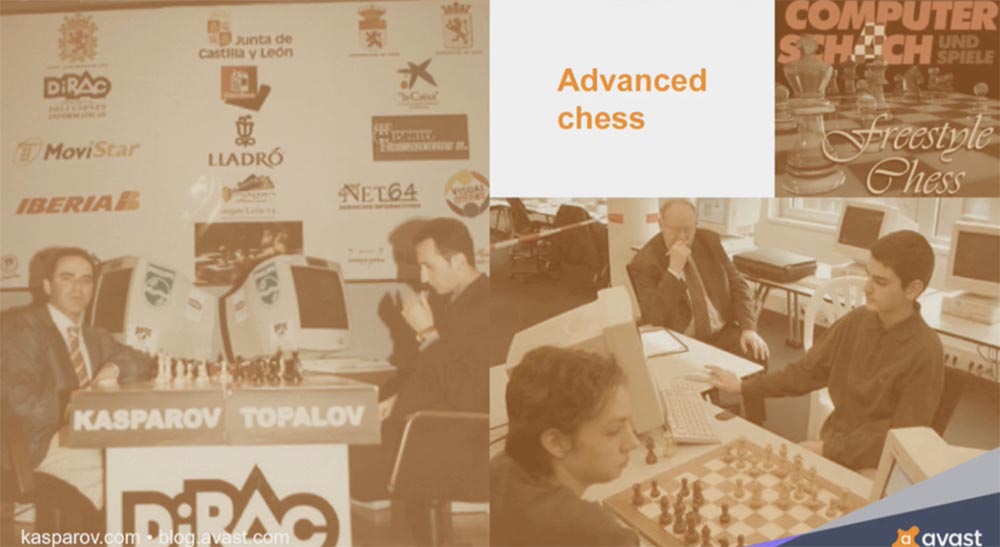
In 1998, I played with a representative of the chess elite from Bulgaria, and the most interesting thing was that we both could not play well because we could not maximize the effect of teamwork with a computer. I wondered why two great players could not benefit from working with the AI. The answer came later with the introduction of the so-called freestyle with a limited number of prompts from the computer. You can play by connecting to a supercomputer via the Internet, you can use your own computer or many computers. I want to note that the man-computer pair will always surpass any supercomputer. The reason is very simple - the computer compensates for our distraction, and we find ourselves in a good position, switching to a computer, because it eliminates vulnerability, when another computer can take advantage of our human weakness.
But this is nothing sensational. The sensation was that the winners of the competition were not high-class players, but relatively weak chess players with ordinary computers, but they managed to create an improved interaction process. This is difficult to articulate because it sounds paradoxical: a weak player plus a regular computer plus an improved process are superior to a strong player with a powerful computer, but a weak interaction process. The interface is everything!
The interesting thing is that you don’t need a strong player at all, don’t need Garry Kasparov to find the best move on the side of the car, and there’s a simple answer to that. If today we look at the relative strengths of a person and a computer, we can go beyond chess, but let's start with them all the same, because there are numbers in chess. So, my record chess rating was 2851 points, until I lost to Magnus Carlsen, and at the time of completing my chess career, he was 2812 points. Today, Magnus Carlsen tops the rating above 2800 points. Approximately 50 players are rated between 2,700 and 2,800 points. This is the elite of the chess world. Nowadays, the power of a computer is within 3200 points, and taking into account specialized software, its rating can reach 3300-3400 points.
Now you understand why you do not need a strong player? Because the player of my level will try to push the computer to act in one direction or another, instead of being with him a simple operator. Therefore, a weaker chess player, who does not have such an “ambition” and such self-conceit as a world champion in chess, will interact with the computer much more efficiently and will form a more productive “human-computer” combination.
I think that this is a very important discovery not only for chess, but also, for example, for medicine. As you know, computers in many cases are able to make a more accurate diagnosis than the best doctors do. So what would you like more: a good doctor in the face of a computer or a good nurse who will just follow the instructions and make a small guide based on the recommendations of the machine?
I do not know the exact numbers, suppose 60-65% of people choose a doctor, and 85% will be at the computer, but psychologically, if you are a good doctor, you cannot accept it. If you look at today's technical progress, then you can say that computers make the true diagnosis in 80 - 85 - 90% of cases, but 10% still remain to people! And this can be a huge difference, because when a bullet deviates by only 1 degree when fired, it can fly at a distance of several hundred meters from the target. The question concerns whether we are able to direct all the power of computer calculations in the right direction.
Therefore, I still believe that all fears that cars will soon replace all of us, and this will be the end of the world, Armageddon - just rumors. Because, as I said, this concerns the creative abilities of a person, and the uniqueness of computer intelligence is that it only enhances our creative abilities, releases them and suggests how to make the best use of them.
Sometimes, to find the answer to a question, it is worthwhile to move away from the world of science and delve into the world of art. I once found an excellent paradox, laid out by the great artist Pablo Picasso: “Computers are useless. The only thing they can do is give answers. ” I think that there is great wisdom in this and these words sound encouraging, because the machines still give answers, and these answers are exhaustive!
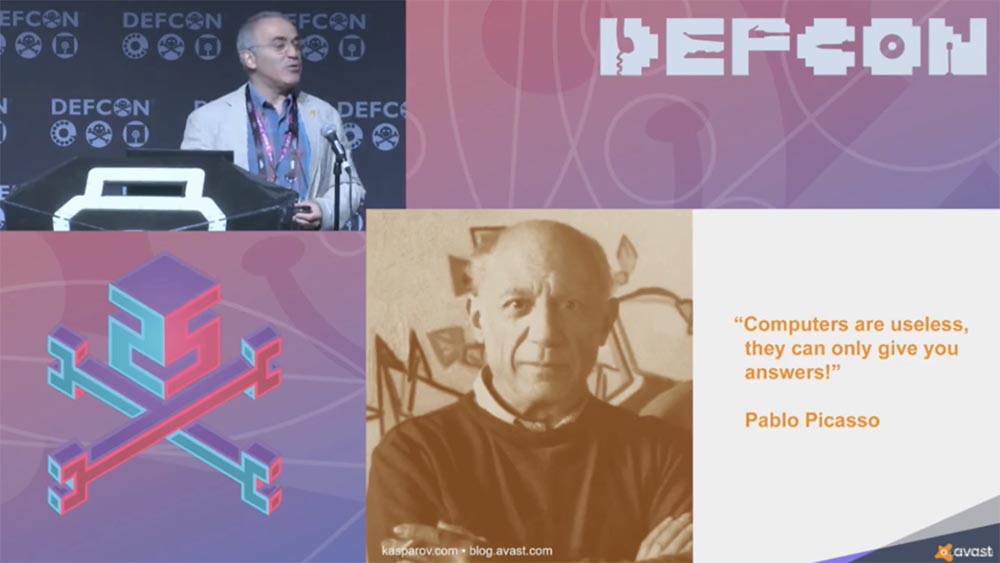
However, Picasso did not satisfy the exhaustive answers, because he was an artist. This is connected with the constant rethinking of art, this is exactly what we constantly do - ask questions. Can computers ask questions?
One day, I visited the Bridgewater Associates hedge fund, where I was going to talk to Dave Feruchchi, one of the developers of the Watson IBM supercomputer. We talked about whether machines can ask questions, and Dave said: “Yes, computers can ask questions, but they don’t know which of the questions really matter.” That is the essence. Thus, we are still in the game and we have a chance to move on, because the game of man and computer is not over yet.
In this slide, you see several photos of possible areas of use of stand-alone computers, machines that can program themselves, that is, they have the ability to learn.

AlphaGo. , , , .
, Deep Blue – brute-force, Watson – , , . AlphaGo — , , , .
, AlphaGo « ». , , Deep Blue, , . AlphaGo, , , 6 9, , , .
, , , , . .
- - Google, Google X. , , , . , , . , , . – !
24:35
Conference DEFCON 25. Garry Kasparov. "The Last Battle of the Brain." Part 2
Thank you for staying with us. Do you like our articles? Want to see more interesting materials? Support us by placing an order or recommending to friends, 30% discount for Habr's users on a unique analogue of the entry-level servers that we invented for you: The whole truth about VPS (KVM) E5-2650 v4 (6 Cores) 10GB DDR4 240GB SSD 1Gbps from $ 20 or how to share the server? (Options are available with RAID1 and RAID10, up to 24 cores and up to 40GB DDR4).
Dell R730xd 2 times cheaper? Only we have 2 x Intel TetraDeca-Core Xeon 2x E5-2697v3 2.6GHz 14C 64GB DDR4 4x960GB SSD 1Gbps 100 TV from $ 199 in the Netherlands! Dell R420 - 2x E5-2430 2.2Ghz 6C 128GB DDR3 2x960GB SSD 1Gbps 100TB - from $ 99! Read about How to build an infrastructure building. class c using servers Dell R730xd E5-2650 v4 worth 9000 euros for a penny?
One slide was lost, but it is really the very south of the USSR, where I was born in the republic, which was located right next to the Republic of Georgia (note of the translator: the name of the state of Georgia and the Republic of Georgia in English sounds the same).

')
Speaking of my homeland, the funny thing is that my last book, Deep Thinking, was written about artificial intelligence, about my own experience of computer battles, and a book written two years before that was called Winter Is Coming. It was not a synopsis of the “Game of Thrones”, it was about Vladimir Putin and the struggle for a free world, but when I conducted a tour of the presentation of this book, everyone wanted to ask me about chess and the IBM Deep Blue computer. Now, when I present the book "Deep Thinking", everyone wants to ask me about Putin. But I try to stick to the topic, and I am sure that after this presentation there will be several questions that I will be happy to answer. I am not a politician, so I don’t shy away from answering questions.

It may seem strange that the game of chess, which arose thousands of years ago, God knows when, is an ideal analogy of artificial intelligence, because when we talk about AI, we must remember that the letter I means "intelligence", and there is nothing that shows it's better than chess.
Many people believe that chess is nothing more than fun, which people indulge in cafes. If you look at the creations of Hollywood, then everyone plays chess - aliens, people X, Wizard, vampires. My favorite film “Casablanca” with Humphrey Bogart is also about chess, and when I watch this film, I always want to take a position to look inside the screen and see Bogart’s board. He plays the French defense, which was very popular in the early 40s. I think Bogart was a pretty decent chess player.
I want to mention that Alfred Binet, one of the co-authors of the IQ-test of the end of the 19th century, admired the mind of chess players and studied it for many years. Therefore, it is not surprising that the game of chess attracts those who want to create smart machines. However, it often happens that intelligent machines, such as the “Turk” von Kempelen, are simply a great deal of cheating. But at the end of the 18th century, this chess machine was a great miracle, he toured Europe and America and fought with strong and weak players, such as Franklin and Napoleon, but of course it was all a hoax. “The Turk” was not a real machine, it was the original mechanical system of sliding panels and mirrors, inside which a powerful player was hiding - a man.
It is interesting that after a hundred or two hundred years, during the last twenty years, the opposite situation is observed - we see in tournaments that human players try to hide computer devices in their pockets. So now we have to look for a computer hidden in a human body.
However, stories with mechanical devices are relatively little known. The first mechanical device for the game of chess appeared in 1912, it played with the help of one mechanical part, it could make a mat a rook, but it could not be called a prototype of the first computer.

Interestingly, the basics of computer design, such as Alan Turing and Claude Shannon, have shown great interest in chess. They believed that the game of chess can reveal the secrets of artificial intelligence. And if one day the computer wins an ordinary chess player or world chess champion, this will be a manifestation of the evolution of AI.
If you remember, in 1952, Alan Turing created the first computer program for playing chess, and this was a great achievement, but even more significant was that at that time there were no computers yet. It was just an algorithm that he used to play chess, and he acted like a human computer processor. It is important to remember that the founding fathers of computers determined the way in which the AI was to follow, following the processes of human thinking. The opposite is what we call a brute-force attack, or a quick search through possible moves.

I did not hear anything about competition with computers in 1985, but in this photo you can see 32 boards, and although I played with people, but in reality it was a real game against computers. At that time there were 4 leading manufacturers of chess computers, which just introduced them to the world. Probably, some of you still have such computers, now they are real rarities. Each manufacturer had 8 computer modules, so really I played with 32 opponents and won all the games.
It is very important that this was not a surprise, but a natural result, and every time I look at this photo, where my victory is captured, I remember this time as the golden age of chess machines, when they were weak, and my hair - thick.
So, it was June 1985, and 12 years later I played against just one computer. In 1997, there was a rematch, because I won the first match that took place in 1996 in Philadelphia. I lost this rematch, but for the sake of fairness, a turning point in computer chess did not take place in 1997, but in 1996, when I won the match, but lost the first game. Then I won 3 games, and the score was 4: 2 in my favor.

In fact, the fact that a computer at that time was able to become a world chess champion if it played in an ordinary chess tournament was important here. I didn’t expect from IBM that they could do such a serious technical work to strengthen their computer in a year. But my biggest mistake, with the exception of a sharp rise in IBM stock prices, which jumped from several points to a billion dollars 2 weeks after the match, was the inability to read the fine print. Because one of the problems of 1996, which I encountered while playing with the Deep Blue computer, was that for me it was a “black box”. I did not know anything about the opponent, about how he thinks, what tactics he uses. Usually, when you prepare for a game, you study your opponent, no matter whether it is a chess match or a football match, and, watching the style of the game, you learn its strategy. But there was no information about the “play style” of Deep Blue.
I tried to be smarter and said that for the next match I should have access to the games played by Deep Blue. They answered: “Of course!”, But at the same time they added in small print:
"... only during official competitions."
And this is despite the fact that Deep Blue has not played a single game outside the laboratory walls. So in 1997 I played against the “black box”, and everything turned out the opposite of the events of 1996 - I won the first game, but lost the match.
By the way, where were you, hackers, 20 years ago, when I needed them so? However, when I look at the ranks of those present, I understand that many of you, probably, were not born yet.
My biggest mistake was that I perceived the match with Deep Blue as a great scientific and social experiment. I thought it would be great, because it would really find an area where human intuition can be compared to the “brute force” of computer calculations. However, Deep Blue, with its phenomenal computing speed of about 2 million chess positions per second, which was quite good for 1997, was anything but artificial intelligence. His game did not contribute to the disclosure of the mystery of human intelligence.

He was intelligent no more than an ordinary alarm clock, but it’s not easier for me that I lost an alarm clock worth $ 10 million.
I remember the press conference during the opening ceremony of the match, when the person in charge of the IBM project said that this would mark the end of scientific experiments and the victory of science. Since we had one victory and one loss, I wanted to play the third match in order to find out who is stronger, but they disassembled the computer, apparently, to remove the only impartial witness. I tried to find out what happened to Deep Blue, but I couldn't find out. Later, I learned that he had made a new career and now he is preparing sushi at one of the terminals at Kennedy Airport.

I love sushi, but I don’t need a computer there. So, on this my story with computer chess pretty quickly ended. But those of you who also play chess or other games know how vulnerable we are compared to computers, because we are not so stable, impartial and make mistakes. Even the highest level players make mistakes, for example, during a match for the title of champion, where 50 or 45 moves are made, at least one tiny mistake is inevitable. If real people play, it doesn’t matter much, but if you make a mistake when playing with a machine, then it’s possible that you won’t lose, but won’t win, because the machine will avoid defeat.
At some point, I realized that it was just a matter of time, because we cannot achieve the same level of vigilance and accuracy that is necessary to defeat a computer, because the machine is unusually stable in its actions. Years later, we witnessed the machines constantly winning matches. I repeat once again - this all concerns only the game of chess, which is very vulnerable to the brute-for-se game method, when a computer goes through a lot of options with great speed and chooses the most optimal one. This is not artificial intelligence, so people make a mistake when they say that a person - a chess player was defeated by artificial intelligence.
Later I played a few more matches against computers. Once I analyzed these games using modern chess engines, and it was a rather painful experience. It was a journey into the past, and I was forced to admit how poorly I played these matches, because I could only blame myself. However, at that time the computer “demon” was not so powerful, you may not believe it, but the free chess application on your mobile device is today stronger than it was Deep Blue. Of course, if you have a chess engine like asmFish or Comodo and the latest laptop, this system will be even more powerful.
When I played against Deep Blue, I think it was the 5th game, the computer in the endgame put the perpetual check, and everyone started saying that it was a great victory and that the computer showed the phenomenal quality of the game. But today, with a modern computer, it looks ridiculous. Our entire match can be played in 30 seconds, maximum a minute depending on the performance of your laptop. In the beginning I made a mistake, then I tried to save the game, Deep Blue made several retaliatory moves and won. These are the rules of the game, and there is nothing wrong with that.
In 2003, I played 2 more matches against the X3D Frintz computer, they both ended in a draw. The organizers made me wear 3-D glasses, because the computer had a 3-dimensional interface.

But in any case, the story was over and I was thinking about the future. Look at this photo that was taken at the beginning of this century.

If you look at these children, it is clear that they play on rare computers. Today, my children will not even understand what it is. Some complex keyboards are depicted here, and now they are simply sliding their fingers along the touchscreen.
The important thing is that more intelligent machines make our tasks much easier. Probably, I say this in vain, because you know it better than anyone else. Thus, with the help of Peppa Pig and technical tasks, the path is cleared for genuine creativity.
I was thinking about how to connect the power of a computer and a person? You can take chess as an example, because there is a solution in chess. You know perfectly well in which areas the computer is strong, and in which it is inferior to man. And then a concept I called “advanced chess” came to my mind.
Following the Russian proverb: “if you cannot win, join us!” I called the game advanced chess when one person with a computer fights against another person with a computer.

In 1998, I played with a representative of the chess elite from Bulgaria, and the most interesting thing was that we both could not play well because we could not maximize the effect of teamwork with a computer. I wondered why two great players could not benefit from working with the AI. The answer came later with the introduction of the so-called freestyle with a limited number of prompts from the computer. You can play by connecting to a supercomputer via the Internet, you can use your own computer or many computers. I want to note that the man-computer pair will always surpass any supercomputer. The reason is very simple - the computer compensates for our distraction, and we find ourselves in a good position, switching to a computer, because it eliminates vulnerability, when another computer can take advantage of our human weakness.
But this is nothing sensational. The sensation was that the winners of the competition were not high-class players, but relatively weak chess players with ordinary computers, but they managed to create an improved interaction process. This is difficult to articulate because it sounds paradoxical: a weak player plus a regular computer plus an improved process are superior to a strong player with a powerful computer, but a weak interaction process. The interface is everything!
The interesting thing is that you don’t need a strong player at all, don’t need Garry Kasparov to find the best move on the side of the car, and there’s a simple answer to that. If today we look at the relative strengths of a person and a computer, we can go beyond chess, but let's start with them all the same, because there are numbers in chess. So, my record chess rating was 2851 points, until I lost to Magnus Carlsen, and at the time of completing my chess career, he was 2812 points. Today, Magnus Carlsen tops the rating above 2800 points. Approximately 50 players are rated between 2,700 and 2,800 points. This is the elite of the chess world. Nowadays, the power of a computer is within 3200 points, and taking into account specialized software, its rating can reach 3300-3400 points.
Now you understand why you do not need a strong player? Because the player of my level will try to push the computer to act in one direction or another, instead of being with him a simple operator. Therefore, a weaker chess player, who does not have such an “ambition” and such self-conceit as a world champion in chess, will interact with the computer much more efficiently and will form a more productive “human-computer” combination.
I think that this is a very important discovery not only for chess, but also, for example, for medicine. As you know, computers in many cases are able to make a more accurate diagnosis than the best doctors do. So what would you like more: a good doctor in the face of a computer or a good nurse who will just follow the instructions and make a small guide based on the recommendations of the machine?
I do not know the exact numbers, suppose 60-65% of people choose a doctor, and 85% will be at the computer, but psychologically, if you are a good doctor, you cannot accept it. If you look at today's technical progress, then you can say that computers make the true diagnosis in 80 - 85 - 90% of cases, but 10% still remain to people! And this can be a huge difference, because when a bullet deviates by only 1 degree when fired, it can fly at a distance of several hundred meters from the target. The question concerns whether we are able to direct all the power of computer calculations in the right direction.
Therefore, I still believe that all fears that cars will soon replace all of us, and this will be the end of the world, Armageddon - just rumors. Because, as I said, this concerns the creative abilities of a person, and the uniqueness of computer intelligence is that it only enhances our creative abilities, releases them and suggests how to make the best use of them.
Sometimes, to find the answer to a question, it is worthwhile to move away from the world of science and delve into the world of art. I once found an excellent paradox, laid out by the great artist Pablo Picasso: “Computers are useless. The only thing they can do is give answers. ” I think that there is great wisdom in this and these words sound encouraging, because the machines still give answers, and these answers are exhaustive!

However, Picasso did not satisfy the exhaustive answers, because he was an artist. This is connected with the constant rethinking of art, this is exactly what we constantly do - ask questions. Can computers ask questions?
One day, I visited the Bridgewater Associates hedge fund, where I was going to talk to Dave Feruchchi, one of the developers of the Watson IBM supercomputer. We talked about whether machines can ask questions, and Dave said: “Yes, computers can ask questions, but they don’t know which of the questions really matter.” That is the essence. Thus, we are still in the game and we have a chance to move on, because the game of man and computer is not over yet.
In this slide, you see several photos of possible areas of use of stand-alone computers, machines that can program themselves, that is, they have the ability to learn.

AlphaGo. , , , .
, Deep Blue – brute-force, Watson – , , . AlphaGo — , , , .
, AlphaGo « ». , , Deep Blue, , . AlphaGo, , , 6 9, , , .
, , , , . .
- - Google, Google X. , , , . , , . , , . – !
24:35
Conference DEFCON 25. Garry Kasparov. "The Last Battle of the Brain." Part 2
Thank you for staying with us. Do you like our articles? Want to see more interesting materials? Support us by placing an order or recommending to friends, 30% discount for Habr's users on a unique analogue of the entry-level servers that we invented for you: The whole truth about VPS (KVM) E5-2650 v4 (6 Cores) 10GB DDR4 240GB SSD 1Gbps from $ 20 or how to share the server? (Options are available with RAID1 and RAID10, up to 24 cores and up to 40GB DDR4).
Dell R730xd 2 times cheaper? Only we have 2 x Intel TetraDeca-Core Xeon 2x E5-2697v3 2.6GHz 14C 64GB DDR4 4x960GB SSD 1Gbps 100 TV from $ 199 in the Netherlands! Dell R420 - 2x E5-2430 2.2Ghz 6C 128GB DDR3 2x960GB SSD 1Gbps 100TB - from $ 99! Read about How to build an infrastructure building. class c using servers Dell R730xd E5-2650 v4 worth 9000 euros for a penny?
Source: https://habr.com/ru/post/457152/
All Articles